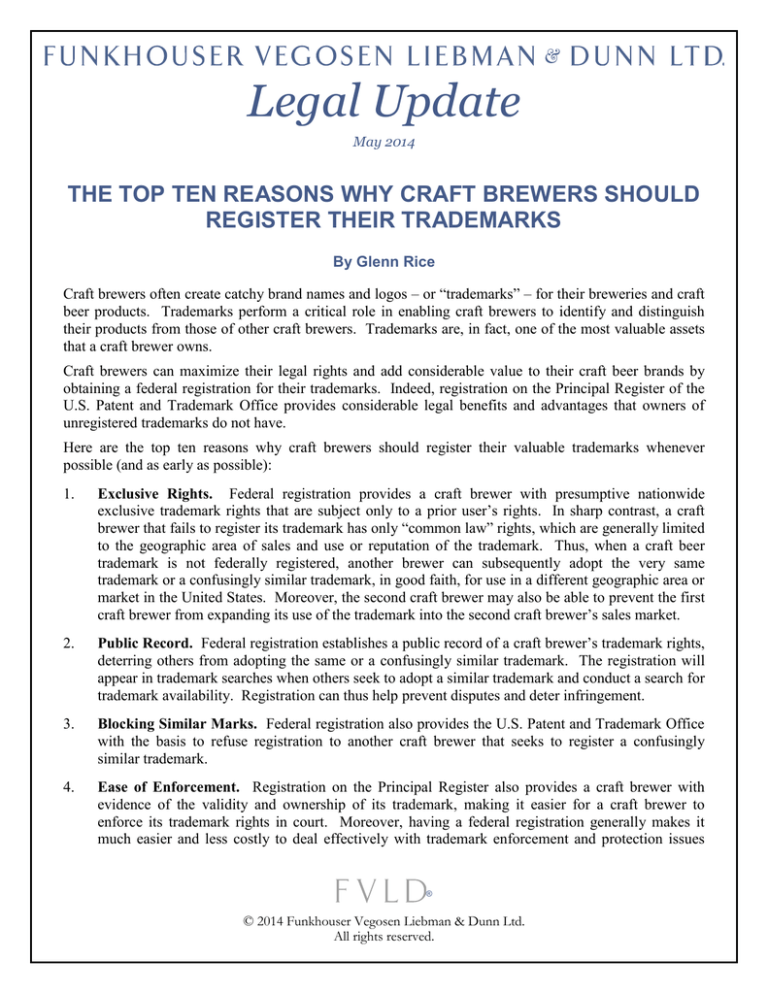
Legal Update
May 2014
THE TOP TEN REASONS WHY CRAFT BREWERS SHOULD
REGISTER THEIR TRADEMARKS
By Glenn Rice
Craft brewers often create catchy brand names and logos – or “trademarks” – for their breweries and craft
beer products. Trademarks perform a critical role in enabling craft brewers to identify and distinguish
their products from those of other craft brewers. Trademarks are, in fact, one of the most valuable assets
that a craft brewer owns.
Craft brewers can maximize their legal rights and add considerable value to their craft beer brands by
obtaining a federal registration for their trademarks. Indeed, registration on the Principal Register of the
U.S. Patent and Trademark Office provides considerable legal benefits and advantages that owners of
unregistered trademarks do not have.
Here are the top ten reasons why craft brewers should register their valuable trademarks whenever
possible (and as early as possible):
1.
Exclusive Rights. Federal registration provides a craft brewer with presumptive nationwide
exclusive trademark rights that are subject only to a prior user’s rights. In sharp contrast, a craft
brewer that fails to register its trademark has only “common law” rights, which are generally limited
to the geographic area of sales and use or reputation of the trademark. Thus, when a craft beer
trademark is not federally registered, another brewer can subsequently adopt the very same
trademark or a confusingly similar trademark, in good faith, for use in a different geographic area or
market in the United States. Moreover, the second craft brewer may also be able to prevent the first
craft brewer from expanding its use of the trademark into the second craft brewer’s sales market.
2.
Public Record. Federal registration establishes a public record of a craft brewer’s trademark rights,
deterring others from adopting the same or a confusingly similar trademark. The registration will
appear in trademark searches when others seek to adopt a similar trademark and conduct a search for
trademark availability. Registration can thus help prevent disputes and deter infringement.
3.
Blocking Similar Marks. Federal registration also provides the U.S. Patent and Trademark Office
with the basis to refuse registration to another craft brewer that seeks to register a confusingly
similar trademark.
4.
Ease of Enforcement. Registration on the Principal Register also provides a craft brewer with
evidence of the validity and ownership of its trademark, making it easier for a craft brewer to
enforce its trademark rights in court. Moreover, having a federal registration generally makes it
much easier and less costly to deal effectively with trademark enforcement and protection issues
®
© 2014 Funkhouser Vegosen Liebman & Dunn Ltd.
All rights reserved.
out-of-court. At bottom, federal registration of a trademark sends a powerful message that a craft
brewer has protected its trademark and intellectual property rights, and will continue to do so, to the
fullest extent.
5.
Added IP Value. Federal registration adds significant value to a craft brewer’s intellectual property
assets. Valuation of a craft brewer’s business (for example, for a sale) includes an investigation of
its intellectual property. Failure to register a craft brewer’s important trademarks may not only
reflect poorly on its management, but also may considerably diminish the value of its business.
6.
® Symbol. Federal registration provides a craft brewer with the right to use the “®” registration
symbol for its registered brands. The law prohibits use of the ® symbol for trademarks that have
not been registered with the U.S. Patent and Trademark Office.
7.
Incontestability. A federally registered trademark is eligible to become “incontestable” after five
years of continuous use in commerce following registration. Once a trademark becomes
incontestable, the validity of the trademark and a craft brewer’s exclusive right to use the trademark
can no longer be attacked on many grounds that could otherwise be raised in the absence of a federal
registration.
8.
Collateral for Loans. Federal registrations for craft beer trademarks can be used as collateral to
secure loans and credit from banks and other lenders.
9.
Increased Recovery in Litigation. In a successful trademark infringement action, a craft brewer
that owns a federal registration may obtain increased damages and also possibly recover its legal
fees.
10.
Renewal in Perpetuity. A craft brewer can renew a federal registration in perpetuity as long as it
continues to use the trademark in commerce.
With the explosive growth of the craft beer industry, trademark disputes involving craft brewers are
increasingly in the news, and craft brewers are often faced with trademark issues that are both nuanced
and complex. Craft brewers need good strategic counseling to help unravel the knotty problems that can
arise in selecting, registering and enforcing their trademarks. To help avoid and minimize trademark
issues, be sure that your craft brewery or brewpub is not only represented by a capable trademark
practitioner, but also that your counsel has a good understanding of the craft beer industry and substantial
experience in representing craft brewers before the U.S. Patent and Trademark Office.
FVLD represents and counsels craft brewers on a wide variety of trademark and brand protection matters, including the selection, registration
and enforcement of trademarks. If we can be of assistance, please call or write Glenn Rice 312.701.6895, grice@fvldlaw.com, or your
regular FVLD contact.
®
© 2014, Funkhouser Vegosen Liebman & Dunn Ltd.
All rights reserved.

